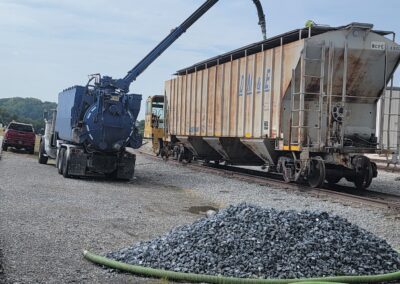
In Pennsylvania, as in many other states across the U.S., hazardous waste management is a critical concern that requires strict adherence to regulations, careful planning, and the use of specialized services to protect public health and the environment. Hazardous materials are substances that, when improperly handled, can pose significant risks to human health, wildlife, and the natural ecosystem. These materials are generated across a wide range of industries, from manufacturing plants and laboratories to healthcare facilities and chemical processing plants.
One of the most crucial aspects of hazardous waste management is transportation. The safe and compliant transportation of hazardous waste ensures that these materials are moved efficiently and securely, minimizing the risk of contamination or accidents. In this guest post, we’ll explore why hazardous waste transportation services in Pennsylvania are essential, the challenges involved, and the key practices that ensure safety and compliance.
The Importance of Hazardous Waste Transportation
Hazardous waste transportation is a vital link in the waste management chain. Once hazardous waste is generated, it must be transported to specialized treatment, storage, or disposal facilities. Improper handling or transportation of these materials could lead to dangerous spills, exposure to toxic substances, fires, explosions, or environmental contamination. Whether it’s a chemical spill, biomedical waste, or industrial by-products, improper transport can result in severe environmental damage and serious public health risks.
In Pennsylvania, which has a diverse industrial base, there is a high demand for professional hazardous waste transportation services. Local and state regulations require businesses to hire certified hazardous waste carriers to ensure that these materials are transported according to stringent guidelines and best practices. This helps protect workers, communities, and natural resources.
Challenges in Hazardous Waste Transportation
The transportation of hazardous materials is far from simple. It involves a range of logistical challenges, including:
- Complex Regulations: Hazardous waste transportation is governed by a variety of local, state, and federal regulations, such as those set by the Pennsylvania Department of Environmental Protection (DEP) and the U.S. Environmental Protection Agency (EPA). These rules dictate everything from how waste must be packaged and labeled to how it is documented and tracked throughout its journey. Ensuring compliance with these complex laws can be difficult, especially for businesses that generate hazardous waste on a smaller scale.
- Safety Concerns: Hazardous materials, by their nature, can be dangerous to human health and the environment. Transporting chemicals, solvents, and other toxic substances requires special equipment, such as sealed containers, leak-proof transport vehicles, and the necessary safety gear for drivers and personnel. Accidents, spills, or leaks during transportation could have severe consequences for both the environment and public safety.
- Emergency Response: In the event of an accident or spill, a swift and effective emergency response is crucial. This requires coordination with local authorities, quick access to specialized cleanup crews, and proper containment strategies to prevent environmental contamination. Companies offering hazardous waste transportation services in Pennsylvania must be well-prepared for these emergencies and have well-trained personnel to mitigate potential hazards.
Best Practices for Safe and Compliant Hazardous Waste Transportation
To ensure safe and compliant hazardous waste transportation, businesses in Pennsylvania rely on transportation service providers that adhere to the best industry practices and follow federal and state guidelines. Here are some key elements of a safe and efficient hazardous waste transportation service:
- Proper Training and Certification: All personnel involved in hazardous waste transportation—drivers, handlers, and support staff—must undergo extensive training. This includes understanding the properties of the hazardous materials being transported, how to handle spills or accidents, and how to comply with all relevant regulations. Certification programs such as those offered by the EPA and the Department of Transportation (DOT) are vital to maintaining high standards of safety.
- Advanced Equipment: Specialized vehicles, containers, and safety equipment are required to handle hazardous waste during transportation. For example, vehicles must be equipped with secondary containment systems to prevent leaks, and containers must be properly sealed to avoid contamination. Service providers in Pennsylvania ensure that their fleet is well-maintained and fully equipped to safely transport hazardous waste.
- Accurate Documentation and Tracking: Proper documentation is required at every stage of the hazardous waste journey. This includes waste manifests, which track the waste from the generator to the treatment, storage, or disposal facility. Service providers use advanced tracking systems to ensure that all documentation is accurate, complete, and readily accessible in the event of an audit or emergency.
- Compliance with Local and Federal Regulations: A reputable hazardous waste transportation provider will stay up-to-date with all federal and state regulations governing hazardous materials. In Pennsylvania, this includes compliance with the PA DEP’s Waste Management regulations, which dictate the safe transportation and disposal of hazardous substances. Non-compliance can result in hefty fines, legal action, and damage to a company’s reputation.
- Environmental Responsibility: Transportation service providers are not only concerned with safety and compliance; they also emphasize environmental responsibility. This includes minimizing the environmental impact of transportation, ensuring that hazardous materials are disposed of in an environmentally safe manner, and taking proactive steps to prevent any pollution or waste leakage.
Conclusion
The transportation of Hazardous environmental waste transportation services Pennsylvania PA is an essential service that ensures the safe and responsible management of dangerous materials. By hiring certified, well-equipped, and experienced hazardous waste transportation providers, businesses can avoid costly accidents, comply with regulations, and protect both human health and the environment. As the state continues to address its environmental challenges, investing in trusted transportation services will play a critical role in securing a safer and cleaner future for all.
